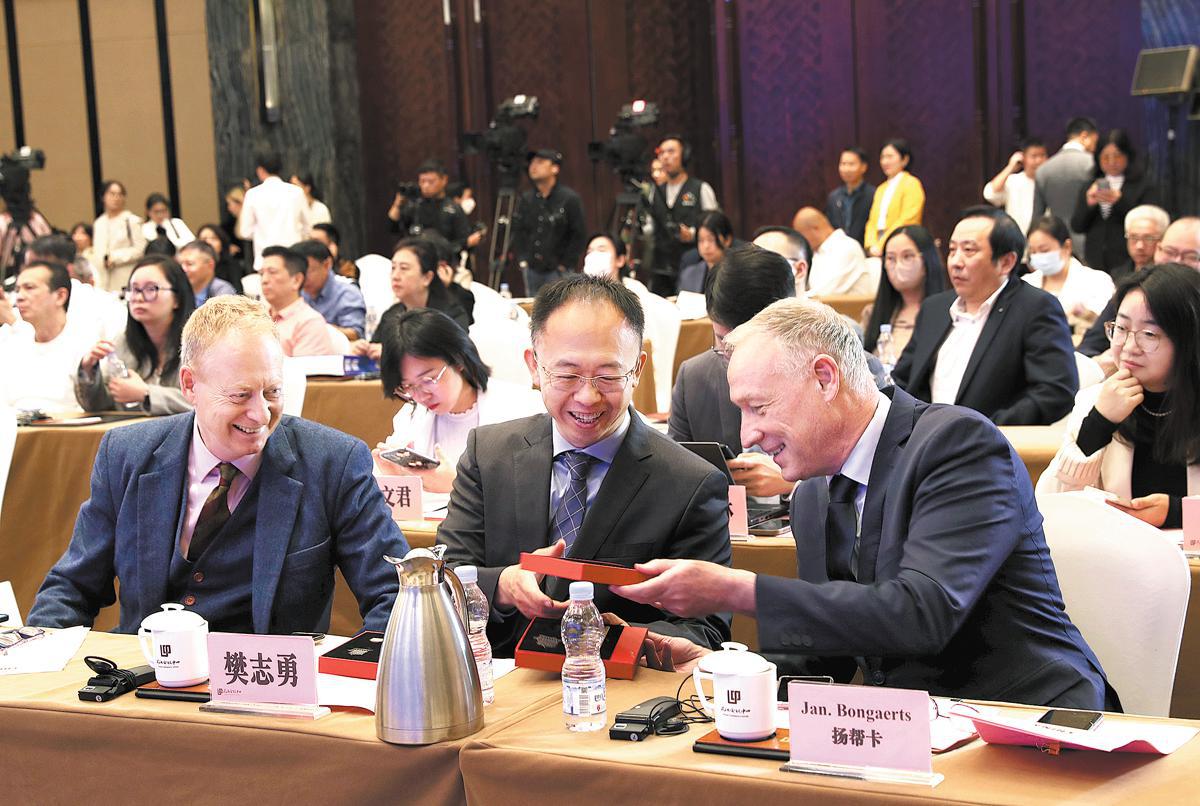Vision China highlights crucial role of science and technology

Guest speakers interact with each other during the Vision China event on Monday in Wuhan, Hubei province. Zou Hong / China Daily
Tech: Experts highlight globalization of innovation
A wide range of scientific and technological exchanges and cooperation both in China and across the world were highlighted at the Vision China event on Monday in the sci-tech powerhouse of Wuhan in Central China's Hubei province.
Under the theme "Leading to the Future with Technological Innovation", Vision China sought to highlight the crucial role of science and technology in contributing to the country's next stage of development.
At the event, hosted jointly by China Daily and Wuhan Municipal People's Government, speakers from various sectors outlined the key trends and functions of fields including manufacturing, artificial intelligence and agricultural technology.
Liu Weiling, deputy editor-in-chief of China Daily, said that China has achieved critical sci-tech breakthroughs and become an innovation-oriented country as the nation has implemented an innovation-driven development strategy and deepened its sci-tech system since the 18th National Congress of the Communist Party of China.
Wuhan has also made remarkable progress in areas such as optoelectronics by leveraging its abundant sci-tech and educational resources, including 92 colleges and universities and 101 research institutes, she said, adding that the city's accomplishments have exemplified China's notable strides as a sci-tech innovator.
"China's achievements in science and technology have not only been a result of global cooperation, but have also made valuable contributions to the international community," Liu said.
"We are committed to sharing stories of how China fosters mutually beneficial sci-tech cooperation and to creating an open, fair, just and nondiscriminatory environment for sci-tech development, while promoting global cooperation in innovation," Liu added.
Wang Yuancheng, vice-mayor of Wuhan, said that the city is a science and innovation hub with national influence.
The city has witnessed a number of breakthroughs in the field of science and technology, including China's first practical optical fiber, the first photoelectric transmission system, and the first international standard for optical communication.
"At present, Wuhan is at a critical stage of upgrading its development stage and transforming its growth momentum," said Wang, who also expressed thanks to sci-tech, economic, academic and business leaders at home and abroad for their suggestions on the city's development.
David Zhu, partner and leader of digital transformation service of Roland Berger China, shared his insights about next-generation manufacturing and six key trends to boost manufacturing competitiveness, such as safe and short supply chains, sustainability and transparency.
He said manufacturing competitiveness is now no longer only determined by product and price, adding that winning markets with manufacturing differentiation should be the final target.
Simon Haworth, a renowned British entrepreneur and investor involved in the biotechnology and agritech markets, and founder of Tramlines Fund, shared the story of the six generations of his family's connection with China and his investment in biotechnology and pharmaceutical research and development in Wuhan, which has promoted scientific and cultural exchanges between China and foreign countries.
Recognizing the growing importance of food for a growing world population, he said that his focus has shifted to agricultural technology innovation.
Haworth said that China has an important position in the world's scientific and technological landscape.
Fan Zhiyong, vice-president and head of intellectual property at Huawei Technologies, said that technological innovation has become increasingly global, citing Huawei's artificial intelligence video services which were developed jointly with the firm's global partners and are widely used.
He said that in order to further globalize innovation, there should be more talents and a robust intellectual property protection system, which also needs global efforts to cultivate.
Jan Bongaerts, senior vice-president of Wuhan-based Yangtze Optical Fibre and Cable, recalled his company's contribution to the city's digital transformation in the past several decades.
He said it is taking advantage of China's policy to export innovative achievements overseas, and is constantly narrowing global digital gap.
The company will strive to be the leader in the optical electronic information sector by being committed to innovation and the Optical Valley of China, a high-tech development zone in Wuhan, he added.
Charles Mackay, a fellow of the Australian Academy of Science, and honorary president of the School of Pharmaceutical Sciences of Qilu University of Technology in Shandong province, analyzed the relationship between diet, gut microbiota and immune response.
He called for more efforts to develop new medicines to help prevent and treat human diseases, based on technological innovation and scientific findings.
Photos
Related Stories
- Xi calls for int'l scientific, technological cooperation
- China delivers core components for world's largest "artificial sun"
- Huge blobs in Earth's mantle might be relics from moon-forming collision: study
- Chinese companies participate in Madrid Tech Show
- China to hold 1st Belt and Road Conference on Science and Technology
- 2023 Apsara Conference held in Hangzhou, E China
Copyright © 2023 People's Daily Online. All Rights Reserved.









